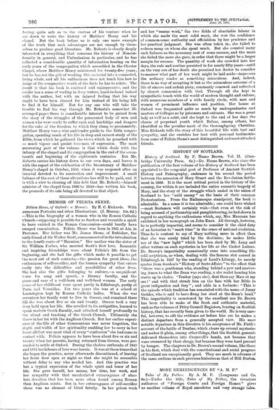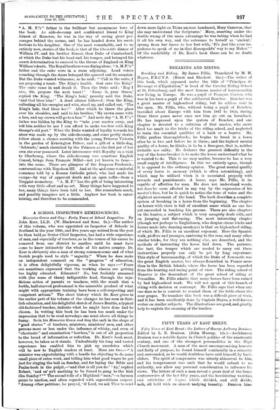MORE REMINISCENCES BY "A. M. F."
Tales of My Father. By A. M. F. (Longmans and Co. 6s.)—Under the title, Tales of My Father, the vivacious authoress of " Foreign Courts and Foreign Homes " gives us another volume of Royal anecdotes and very strange tales.
"A. M. F.'s" father is the brilliant but anonymous hero of the book. As aide-de-camp and confidential friend to King Ernest of Hanover, ho was in the way of seeing great per- sonages behind the scenes, and he has handed down his recol- lections to his daughter. One of the most remarkable, and to us entirely new, stories of the book, is that of the fete-148e dinner of William IV. and his brother Ernest, then Duke of Cumberland, at which the Duke lost his head and his temper, and betrayed his secret determination to succeed to the throne of England on King William's death. The Royal brotherswere dining alone. "A.M.F.'s" father and the suite were in a room adjoining. Loud voices sounding through the doors betrayed the quarrel and its occasion. But the Duke wanted witnesses; so ho said: "'Call in the suite, I am proposing a toast: Tho King's health. God save the King!' The suite came in and drank it. Then the Duke said : May I also, Sir, propose the next toast ? " Name it, your Grace,' replied the King. 'The King's heir,' proudly said the Duke, `and God bless him!' A dead silence followed : then the King, collecting all his energies and wits, stood up, and called out, 'The King's heir, God bless her ! ' After which he threw the glass over his shoulder, and said to his brother, My crown came with a lass, and my crown will go to a lass.'" And next day "A. M. F.'s" father was bidden by the King to " t,ako your master away, and tell him neither he nor I can afford to make too free with King George's old port." What the Duke wanted of loyalty towards his niece was made up by the aide-de-camp, and some pretty stories follow about a chance meeting with the young Princess Victoria in the garden of Kensington Palace, and a gift of a little dog, 'Schwartz,' much cherished by the Princess as the first pet of her own she ever possessed. Later intercourse with Royalty on a visit to Cherbourg, where the aide-de-camp was sometime English Consul, brine 7ein Francoia Millet—not yet known to fame— into the scene. There are glimpses of the Empress Frederick ; conversations with Napoleon III. And at the and come wonderful romances told by a Roman Catholic priest, who had made his escape—by way of apparent death and an open coffin—from a Trappist monastery. "A. M. F." has the gift of being interesting with very little effort and no art. Many things have happened to her, many things have beeii told to her. She remembers much, and possibly imagines not a little. Anyhow her book is enter- taining, and therefore to be commended.



















































 Previous page
Previous page